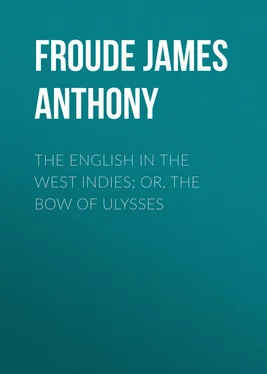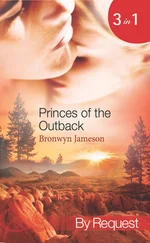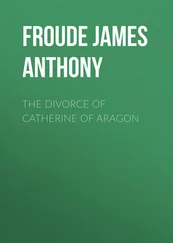James Froude - The English in the West Indies; Or, The Bow of Ulysses
Здесь есть возможность читать онлайн «James Froude - The English in the West Indies; Or, The Bow of Ulysses» — ознакомительный отрывок электронной книги совершенно бесплатно, а после прочтения отрывка купить полную версию. В некоторых случаях можно слушать аудио, скачать через торрент в формате fb2 и присутствует краткое содержание. Жанр: foreign_antique, foreign_prose, Путешествия и география, на английском языке. Описание произведения, (предисловие) а так же отзывы посетителей доступны на портале библиотеки ЛибКат.
- Название:The English in the West Indies; Or, The Bow of Ulysses
- Автор:
- Жанр:
- Год:неизвестен
- ISBN:нет данных
- Рейтинг книги:5 / 5. Голосов: 1
-
Избранное:Добавить в избранное
- Отзывы:
-
Ваша оценка:
- 100
- 1
- 2
- 3
- 4
- 5
The English in the West Indies; Or, The Bow of Ulysses: краткое содержание, описание и аннотация
Предлагаем к чтению аннотацию, описание, краткое содержание или предисловие (зависит от того, что написал сам автор книги «The English in the West Indies; Or, The Bow of Ulysses»). Если вы не нашли необходимую информацию о книге — напишите в комментариях, мы постараемся отыскать её.
The English in the West Indies; Or, The Bow of Ulysses — читать онлайн ознакомительный отрывок
Ниже представлен текст книги, разбитый по страницам. Система сохранения места последней прочитанной страницы, позволяет с удобством читать онлайн бесплатно книгу «The English in the West Indies; Or, The Bow of Ulysses», без необходимости каждый раз заново искать на чём Вы остановились. Поставьте закладку, и сможете в любой момент перейти на страницу, на которой закончили чтение.
Интервал:
Закладка:
Adventurers, buccaneers, pirates pass across the stage – the curtain falls on them, and rises on a more glorious scene. Jamaica had become the depôt of the trade of England with the western world, and golden streams had poured into Port Royal. Barbadoes was unoccupied when England took possession of it, and never passed out of our hands; but the Antilles – the Anterior Isles – which stand like a string of emeralds round the neck of the Caribbean Sea, had been most of them colonised and occupied by the French, and during the wars of the last century were the objects of a never ceasing conflict between their fleets and ours. The French had planted their language there, they had planted their religion there, and the blacks of these islands generally still speak the French patois and call themselves Catholics; but it was deemed essential to our interests that the Antilles should be not French but English, and Antigua, Martinique, St. Lucia, St. Vincent, and Grenada were taken and retaken and taken again in a struggle perpetually renewed. When the American colonies revolted, the West Indies became involved in the revolutionary hurricane. France, Spain, and Holland – our three ocean rivals – combined in a supreme effort to tear from us our Imperial power. The opportunity was seized by Irish patriots to clamour for Irish nationality, and by the English Radicals to demand liberty and the rights of man. It was the most critical moment in later English history. If we had yielded to peace on the terms which our enemies offered, and the English Liberals wished us to accept, the star of Great Britain would have set for ever.
The West Indies were then under the charge of Rodney, whose brilliant successes had already made his name famous. He had done his country more than yeoman's service. He had torn the Leeward Islands from the French. He had punished the Hollanders for joining the coalition by taking the island of St. Eustachius and three millions' worth of stores and money. The patriot party at home led by Fox and Burke were ill pleased with these victories, for they wished us to be driven into surrender. Burke denounced Rodney as he denounced Warren Hastings, and Rodney was called home to answer for himself. In his absence Demerara, the Leeward Islands, St. Eustachius itself, were captured or recovered by the enemy. The French fleet, now supreme in the western waters, blockaded Lord Cornwallis at York Town and forced him to capitulate. The Spaniards had fitted out a fleet at Havannah, and the Count de Grasse, the French admiral, fresh from the victorious thunder of the American cannon, hastened back to refurnish himself at Martinique, intending to join the Spaniards, tear Jamaica from us, and drive us finally and completely out of the West Indies. One chance remained. Rodney was ordered back to his station, and he went at his best speed, taking all the ships with him which could then be spared. It was mid-winter. He forced his way to Barbadoes in five weeks spite of equinoctial storms. The Whig orators were indignant. They insisted that we were beaten; there had been bloodshed enough, and we must sit down in our humiliation. The Government yielded, and a peremptory order followed on Rodney's track, 'Strike your flag and come home.' Had that fatal command reached him Gibraltar would have fallen and Hastings's Indian Empire would have melted into air. But Rodney knew that his time was short, and he had been prompt to use it. Before the order came, the severest naval battle in English annals had been fought and won. De Grasse was a prisoner, and the French fleet was scattered into wreck and ruin.
De Grasse had refitted in the Martinique dockyards. He himself and every officer in the fleet was confident that England was at last done for, and that nothing was left but to gather the fruits of the victory which was theirs already. Not Xerxes, when he broke through Thermopylae and watched from the shore his thousand galleys streaming down to the Gulf of Salamis, was more assured that his prize was in his hands than De Grasse on the deck of the 'Ville de Paris,' the finest ship then floating on the seas, when he heard that Rodney was at St. Lucia and intended to engage him. He did not even believe that the English after so many reverses would venture to meddle with a fleet superior in force and inspirited with victory. All the Antilles except St. Lucia were his own. Tobago, Grenada, the Grenadines, St. Vincent, Martinique, Dominica, Guadaloupe, Montserrat, Nevis, Antigua, and St. Kitts, he held them all in proud possession, a string of gems, each island large as or larger than the Isle of Man, rising up with high volcanic peaks clothed from base to crest with forest, carved into deep ravines, and fringed with luxuriant plains. In St. Lucia alone, lying between St. Vincent and Dominica, the English flag still flew, and Rodney lay there in the harbour at Castries. On April 8, 1782, the signal came from the north end of the island that the French fleet had sailed. Martinique is in sight of St. Lucia, and the rock is still shown from which Rodney had watched day by day for signs that they were moving. They were out at last, and he instantly weighed and followed. The air was light, and De Grasse was under the high lands of Dominica before Rodney came up with him. Both fleets were becalmed, and the English were scattered and divided by a current which runs between the islands. A breeze at last blew off the land. The French were the first to feel it, and were able to attack at advantage the leading English division. Had De Grasse 'come down as he ought,' Rodney thought that the consequences might have been serious. In careless imagination of superiority they let the chance go by. They kept at a distance, firing long shots, which as it was did considerable damage. The two following days the fleets manœuvred in sight of each other. On the night of the eleventh Rodney made signal for the whole fleet to go south under press of sail. The French thought he was flying. He tacked at two in the morning, and at daybreak found himself where he wished to be, with the, French fleet on his lee quarter. The French looking for nothing but again a distant cannonade, continued leisurely along under the north highlands of Dominica towards the channel which separates that island from Guadaloupe. In number of ships the fleets were equal; in size and complement of crew the French were immensely superior; and besides the ordinary ships' companies they had twenty thousand soldiers on board who were to be used in the conquest of Jamaica. Knowing well that a defeat at that moment would be to England irreparable ruin, they did not dream that Rodney would be allowed, even if he wished it, to risk a close and decisive engagement. The English admiral was aware also that his country's fate was in his hands. It was one of those supreme moments which great men dare to use and small men tremble at. He had the advantage of the wind, and could force a battle or decline it, as he pleased. With clear daylight the signal to engage was flying from the masthead of the 'Formidable,' Rodney's ship. At seven in the morning, April 12, 1782, the whole fleet bore down obliquely on the French line, cutting it directly in two. Rodney led in person. Having passed through and broken up their order he tacked again, still keeping the wind. The French, thrown into confusion, were unable to reform, and the battle resolved itself into a number of separate engagements in which the English had the choice of position.
Rodney in passing through the enemy's lines the first time had exchanged broadsides with the 'Glorieux,' a seventy-four, at close range. He had shot away her masts and bowsprit, and left her a bare hull; her flag, however, still flying, being nailed to a splintered spar. So he left her unable to stir; and after he had gone about came himself yardarm to yardarm with the superb 'Ville de Paris,' the pride of France, the largest ship in the then world, where De Grasse commanded in person. All day long the cannon roared. Rodney had on board a favourite bantam cock, which stood perched upon the poop of the 'Formidable' through the whole action, its shrill voice heard crowing through the thunder of the broadsides. One by one the French ships struck their flags or fought on till they foundered and went down. The carnage on board them was terrible, crowded as they were with the troops for Jamaica. Fourteen thousand were reckoned to have been killed, besides the prisoners. The 'Ville de Paris' surrendered last, fighting desperately after hope was gone till her masts were so shattered that they could not bear a sail, and her decks above and below were littered over with mangled limbs. De Grasse gave up his sword to Rodney on the 'Formidable's' quarter-deck. The gallant 'Glorieux,' unable to fly, and seeing the battle lost, hauled down her flag, but not till the undisabled remnants of her crew were too few to throw the dead into the sea. Other ships took fire and blew up. Half the French fleet were either taken or sunk; the rest crawled away for the time, most of them to be picked up afterwards like crippled birds.
Читать дальшеИнтервал:
Закладка:
Похожие книги на «The English in the West Indies; Or, The Bow of Ulysses»
Представляем Вашему вниманию похожие книги на «The English in the West Indies; Or, The Bow of Ulysses» списком для выбора. Мы отобрали схожую по названию и смыслу литературу в надежде предоставить читателям больше вариантов отыскать новые, интересные, ещё непрочитанные произведения.
Обсуждение, отзывы о книге «The English in the West Indies; Or, The Bow of Ulysses» и просто собственные мнения читателей. Оставьте ваши комментарии, напишите, что Вы думаете о произведении, его смысле или главных героях. Укажите что конкретно понравилось, а что нет, и почему Вы так считаете.












